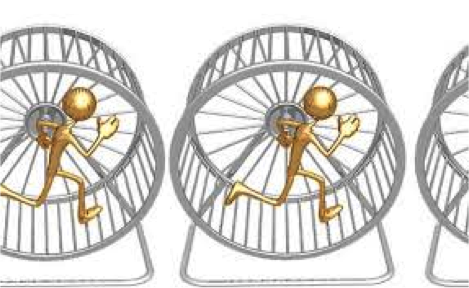 Do you feel fulfilled and accomplished at the end of the day? Or are you more often frustrated over what you did not get done? When no matter how much you do still feels like you haven’t done enough, it can become overwhelming and sometimes physically exhausting, a little like a hamster on a wheel. Well, we know there is much more to you than that, however this is a common feeling shared by many business leaders.
Do you feel fulfilled and accomplished at the end of the day? Or are you more often frustrated over what you did not get done? When no matter how much you do still feels like you haven’t done enough, it can become overwhelming and sometimes physically exhausting, a little like a hamster on a wheel. Well, we know there is much more to you than that, however this is a common feeling shared by many business leaders.
It’s not productive and doesn't make the most of our time and talents.
So why is it that some leaders struggle to feel accomplished, while others just cruise through their to-do lists? Accomplished or not, we all have the same 24-hours in our day, and a limited supply of attention and energy. Balancing time for the more important things in life such as having fun with family and friends or relaxing is something we all want to do. The differentiating factor between feeling accomplished during that time, and feeling like a fast hamster on a wheel, is in deciding what NOT to do, or what to STOP doing in your life.
Here Are 7 Things Very Effective People STOP Doing
1) Inefficient Use Of Travel Time
Are you traveling to a meeting or stuck in traffic where the same outcome can be achieved via phone or Skype? I am a huge advocate for live meetings with clients, prospects and team members because it increases engagement and builds the relationship. However not all meetings need that. Review your calendar over the last 3 weeks and identify such travel time wasters and STOP them moving forward.
2) Meetings That Go On Too Long
This is a very common complaint I hear from clients. My answer is often "How might you change that?" It is amazing how something so simple turns the conversation around to empowerment and positive change. Most meetings should have a clear purpose with assigned decision makers, with only the necessary stakeholders and advisors at the table. Yet many have everyone present and no decisions are made. Before you know it the next follow-up meeting is sucking up time on your calendar! STOP saying yes to meetings you don't need to be at. Help the team get clarity on the meeting purpose and define decision makers.
3) Negative People Sucking The Energy From You
Don’t WASTE your time with Negatives; INVEST your time with Positives. As soon as you read that previous sentence most of you will have had a vivid picture of your "Mr. Negative." Some people are wired that way and unfortunately it can be contagious. Avoid them where possible.
What leadership energy are you signaling? Positive or negative? Be positive and create a solution-based culture in your team. Expect team members to bring you 2 possible solutions for each problem they face and set the same example yourself.
4) Procrastinating
STOP allowing things to hang over your head. It will take less time and energy in the long run if you do them now. However make sure the important tasks take greater priority over the "urgent." Often urgent tasks exist because of someone else's agenda, not yours. Giving your attention to these activities drains from what is most important to you (this is where clear goal setting comes in, without clear goals it is much harder to determine priorities).
5) Making Promises You Can’t Keep
There are many wonderful leaders I have had the opportunity to meet who have a strong desire to be liked, and as such, are very keen to please others. However this creates stress, drains our energy and unfortunately others can take advantage of such a good nature. STOP agreeing to do something that is not a priority for you or your team. If you can’t do it, STOP wasting your time talking or worrying about it.
Charlie, a manager that worked for me in the corporate world used to say, "Control what you can control." An initial reaction to that might make you think Charlie was a control freak. He wasn't. However through experience and personal growth he realized that letting go of those issues or opportunities that he could not affect empowered him to focus on what he could. Charlie's common phrase of "control what you can control" soon began to impact me and his peers and it was a rule of thumb that helped make our leadership teams much more productive and positive.
It is often the simple approaches that work the best over time.
6) Indecisiveness
Take risks. If you win you will be happy, if you lose you will be wise. STOP agonizing over small decisions; make them and move on. Be willing to take risk as a leader because that is often how we learn. If you jot down the benefits of your decision and consider the worst thing that might happen, that often gives you the confidence to move forward. Our irrational fears are frequently what get in our way. Taking the time to think through the up side and down side helps us decide. The biggest risk one can take is not to take one!
7) Waiting…Waiting…Waiting
STOP waiting for things to happen. Make them happen!
I am sure you have heard the saying "Luck is when preparation meets opportunity." Prepare, learn and get ready for when the opportunity arises to seize the day. In most situations we have more control over circumstances than we think.
In summary your time is precious and so are your Strengths. Use them consciously and don't let the speed of your hamster wheel allow others to control your days and productivity. I encourage you to choose a couple of these tips that are most relevant to you. Put them somewhere you can see them daily in order to help you increase your productivity in a sustainable way.
 Written by Jayne Jenkins, CEO Churchill Leadership Group-Jayne, a STAND OUT Master Strengths Coach and Workshop Facilitator, is a leadership business veteran working with some of the largest companies in the world including Exxon, AstraZeneca and Sanofi-Aventis. She has over 23 years of experience leading successful sales teams and holding positions in Marketing, Strategic Operations and Organization Development. As CEO of Churchill Leadership Group, Jane consults and coaches teams to maximize the impact of Managers and Teams through a focus on STRENGTHS for sustainable results.
Written by Jayne Jenkins, CEO Churchill Leadership Group-Jayne, a STAND OUT Master Strengths Coach and Workshop Facilitator, is a leadership business veteran working with some of the largest companies in the world including Exxon, AstraZeneca and Sanofi-Aventis. She has over 23 years of experience leading successful sales teams and holding positions in Marketing, Strategic Operations and Organization Development. As CEO of Churchill Leadership Group, Jane consults and coaches teams to maximize the impact of Managers and Teams through a focus on STRENGTHS for sustainable results.
Do you have a question for Jayne? Post it in our Senior Manager Community and she will be happy to help: Ask an Expert
Did you find this article informative? Let us keep you up-to-date on all of our training articles. Please sign up for our newsletter today!